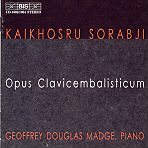Kaikhosru Sorabji’s Opus Clavicembalisicum is arguably the longest non-repetitive piano composition ever published. Modeled on Busoni’s Fantasia Contrappuntistica, OC’s structure encompasses, among other things, two large variation sets, a pair of cadenzas, and four immense fugues. The piano writing is crisco-thick with notes, notes, and more notes, spread out on as many as seven staves. Is it playable by two hands? More or less. Geoffrey Douglas Madge is more accurate and relaxed in this 1983 live Chicago performance than in his 1982 reading once available on LP. Annotator Kenneth Derus totes Madges’ virtues over John Ogdon’s studio recording, which times out nearly an hour longer. I disagree. While Ogdon’s basic tempos for the fugues are perhaps too slow, the English pianist brings more varied voicings, color shadings, and dynamic scaling to the music, making it sound less harmonically discombobulated and formally pretentious than it is. But Madge is hardly an also-ran in this challenging and perhaps thankless work. And at five discs for the price of three, it’s cheaper than the full-priced Altarus four-disc set. Sample before you buy, though.
































